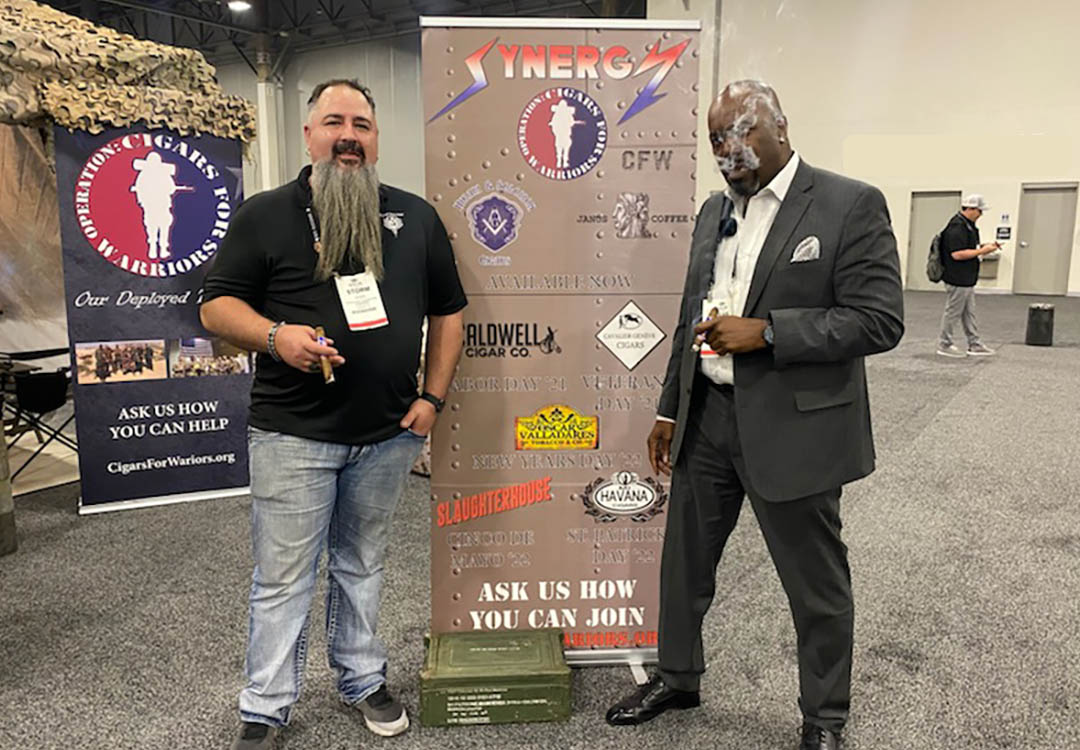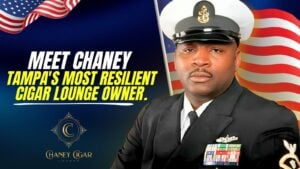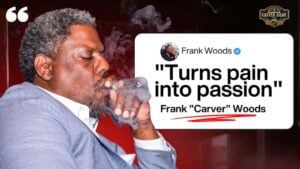
Learn more about Cigars for Warriors in their feature article over on Where to Lite Up!
Seãn Johnson:
Hey, everybody. This is Seãn Johnson, here at the 2021, PCA, and I’m sitting here… I was supposed to actually meet with you guys last… Well, 2020 never happened, in 2019. And I totally missed the mark, so I made sure that you guys were going to be my first interview this time around, okay?
Storm Boen:
I appreciate that.
Seãn Johnson:
By the way, I’m here with Storm. Hey, listen.
Storm Boen:
Seãn.
Seãn Johnson:
Thank you and I’m going to be saying this to all the interviews, every time someone sits in that chair, thank you for your service. Now, let me ask you a question. Tell me about you, your organization and how you got involved in this.
Storm Boen:
Well, I was one of the original six founders. I was in the military still, I’d been injured, I’m on medical leave, about to get out after almost 19 years in the army. A young man of 70 years old that I met, he was a submariner back in Korea war. We were talking about what cigars meant to us while we were in combat. Two different generations, two different combats, two different styles. I was in urban combat, he was in submarine combat. And it was pretty neat because the meaning of the cigar for us was literally almost the exact same. It was one of the few things that normalize something. It was one of the few things that made you feel like you’re at home. It wasn’t such a distress, it gives you an hour and a half of deescalating that stress that you don’t even realize you’re building up.
Storm Boen:
You’ve got guys who’s overseas, it’s very slow, there’s a lot of stress there. If you’re on a submarine, one minute it’s hectic, next minute you’re just doing nothing. Army’s the same way, you’ve got a lot of guys who were outside the gate every day and the other guys are not. Well, I’ve heard people say stuff, they’re like, “Oh, the guy’s got a bag back in the rear.” Fuck that. Excuse me. You can’t have that because that’s a whole ‘nother stress that you can’t even imagine. You’re just basically waiting and someone’s going to drop something on you.
Seãn Johnson:
Exactly.
Storm Boen:
You’re just a slow – just hours of just slowly moving, so you get a chance to sit down and smoke a cigar with your buddies. And what I would personally do is take my rank off. So, my guys knew after a really bad day, I’m going to take my rank off and they could say anything they wanted to say, which it was pretty much how you do-
Seãn Johnson:
So, really, you were cognizant of creating a stress-free zone. No rank, just a bunch of guys hanging around.
Storm Boen:
Yes and usually I got called a lot of names but they knew they could get away with it. So, it was basically crisis deescalation management, which is a lot of SWAT teams would teach that. Otherwise, you’d get around and talk about what’s going on. Instead of me asking them questions, they just enjoy themselves. And especially in 2003, I was very concerned about that because there were so many suicides in Iraq and a lot of it was just the pressure. You’re not afraid of someone, it’s just that things we’ve been told that’s going to happen to you, so that just anticipation was so powerful. And we were outside the wire and when we get hit or something, I didn’t want my guys going off to all corners thinking of stuff. I want them to evaluate what’s going on. And I’m thinking that was an original idea, I’m going to find out it’s been going on for generations.
Storm Boen:
So, we were all talking about it and to make a really long story short, we started the charity. I brought in six other guys. I started another social media forum, there was supposed to be five of us and the first day was 1500. And now it’s around 15,000 or so. It was the first non fanboy group. You can like any cigar you want, you can be honest, if you bought cigars online, good for you and we can have women in this cigar group. Back of the day, no one wanted any of that. So, the gig was for five people and the charity was only supposed to be an hour or two a month working and we just wanted to say thank you for the men and women that are out there. Over night, it just took off.
Storm Boen:
In fact, our first board meeting, I had three stipulations of what I really wanted to do. I said, “We’re going to go hard and fast, 100% by the book, to do all our association, bylaws, 501(c)(3),” and they’re all looking at me like… Now, we’re all on Zoom because none of us live in the same town or I think those days it was Google Hangout.
Seãn Johnson:
Google Hangout. Yep, yep.
Storm Boen:
I can do that part. I said, “The only thing I don’t want to do is I don’t want to run anything.” So, we start doing the voting and I already created the positions and started doing the voting and I’m like, “I could have done that one.” The last vote was the CEO’s and I got that. But I understand the philosophy, I was the owner, I was about to retire from the military, so I was going to have a lot of free time. Again, thinking two, three hours a month. So, I said, “First year, we’re going to have a hard goal, pretty much impossible for the first year.”
Seãn Johnson:
Why was that?
Storm Boen:
We didn’t even know how many cigars we had to send our troops and we’re all looking at each other, like… So, I just randomly threw a number. I said, “800 cigars.” Oh man, I got called worse names than my troops called me. Man, there’s no way. Who are we going to send them to? How are we going to find them? Where are we going to get the money to send them? Who’s going to send them? Where are we going to get the cigars? I don’t know, that’s why it’s an impossible goal.
Storm Boen:
First month, 860 cigars. First year, 92,300 cigars. And now we’re at 1.2 million cigars shipped. Plus, a couple thousand pounds of coffee. Thousands of cutters, lighters, magazines. We send a magazine in every box. Cigar Press has been with us since day one.
Seãn Johnson:
Wow.
Storm Boen:
Boveda has been with us since day one, Drew Estate’s been with us since day one.
Seãn Johnson:
Wow. So, let me ask you a question. With all that’s going on, what do you think was the most defining moment for you in the sense of once it took off? What was the most defining moment? That, “Okay. Man, I can’t believe this happened.” Was it being covered by a magazine? Something more closer to your heart? What was it?
Storm Boen:
Well, for me. Because of the building of it, when we got our 501(c)(3) being the most nonpolitically correct charity on the freaking planet. Especially in those days, if you were any kind of conservative, political or charity, they were getting pushed out. Normally, it takes four to six weeks, that’s what it says on the paperwork. You either get corrections, you get told, “No,” or you get past. Six months later, we got it, no corrections. So, yes. That was, for me, a very defining moment because you can call yourself a nonprofit all day long but it’s fairly easy to do that. But getting your 501(c)(3), keeping it, now you’ve got feds watching, you’ve got IRS watching, it creates a legitimacy. It’s something I’m very proud of, that legitimacy factor. Huge.
Storm Boen:
Now, I would say the second defining moment was in 2012. John Drew said, “Outside the money, outside the cigars, what can I do for you guys?” Visit our trade shows. The dumbest idea I’ve ever heard. Why are you going to be at a trade show? There’s nothing you can do there. You can’t collect cigars. I said, “I know. Just let it go.” I said, “You keep talking about trust, trust me that I have an idea.” He said, “All right.”
Storm Boen:
Create a little card table in the middle of gigantic Drew’s Estate booth. But what it did, it put us five years ahead of the game because everybody knew the work ethics that John Drew had Drew Estate had. And we were in there, everybody knew they were going to do some serious background. And he did. And he wanted to see the bylaws, he wanted to see our association, he wanted to meet every board director.
Storm Boen:
Now, again, none of us lived in the same state which lead to the same city. So, once he did, his idea was, “I’ve been supporting all these military charities but I had no idea if they were legit. I have no idea if they actually went to someone. I want to put all of my charity into one organization.” He said, “The military is my love. So, I want to go behind you guys 100%,” and he did, which brought all the other manufacturers to support us as well. Cigar Press got on board very quickly. I mean, having three pages in a magazine was very heady as you can imagine.
Seãn Johnson:
Now, I want to close off like this. For everybody and every one of you guys that I interview… Because I want to drive the point home, I want to drive the point home. We need to do something, we need to continue doing what we’re doing. How can they contribute to your organization?
Storm Boen:
I’m going to say three things. There’s about 12 but I’m going to say three. Number one is find out what the Synergy Program is and go to your cigar shop and say, “Hey, do you have any cigars or where are your cigars?” We have six companies and that’s all we ever wanted, was six, and I thought it would take six years. Because, basically, these companies, they’ll showcase cigar and giving us 100% of their profit and they were going to sell them for us.
Seãn Johnson:
Wow.
Storm Boen:
That’s huge. And the benefit for them at showcases, they get a chance to be in shops that maybe they’re not in. Reverse, is we have donation centers. This is point number two, if you’re a retailer, become a donation center, a legitimate one. A legitimate one, we have paperwork. Very simple but we’re there to make you a lot of money. Literally cost you nothing, we’re not DA, you just make money from us. We’re going to get our donations naturally, it’s a very simple process.
Storm Boen:
And then number three, always, is volunteer. Just because I say volunteer, we’re not talking my hours. We’re not talking about board director, we’re talking you want to be a bid coordinator, which is the funnest. But it is the heart of what CFW is, our bid coordinators. And they’ll take over a single shop or an event and they’ll run it. They’ll be in there, have a table which is kind of like this but a lot smaller. But it helps that shop owner make money, it helps that rep double his… He can upscale all day long once that’s there and we get the donations naturally and it gives us the word is out. The word spreads, which is… And I believe there’s things called micro volunteer zone. Small elements produces greater results. Same thing as micro marketing that people all hate. The word, “Charity,” so we had to start with little small fires-
Seãn Johnson:
With small fires, okay.
Storm Boen:
… and slow process but it’s worked.
Seãn Johnson:
Storm. I just want to say thank you and you heard it. Listen, there’s a cigar shop at least five miles away from you. You pass it all the time. You can actually go to the website and you’ll see down here at the bottom, you can go to the website and get that information. Now, until next time, I want you to do one thing, have great cigar conversations.
Check out the Cigars for Warriors feature article over on Where to Lite Up!
Thank you for watching another episode of Cigar Conversations. For more information or to comment on previous shows, visit us at cigarconversations.com. Or if you’d like to appear on a future show or advertise with Cigar Conversations, send us an email to us at ads@cigarconversations.com.



